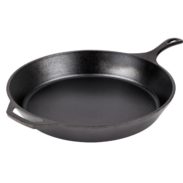
How to Clean a Cast Iron Skillet
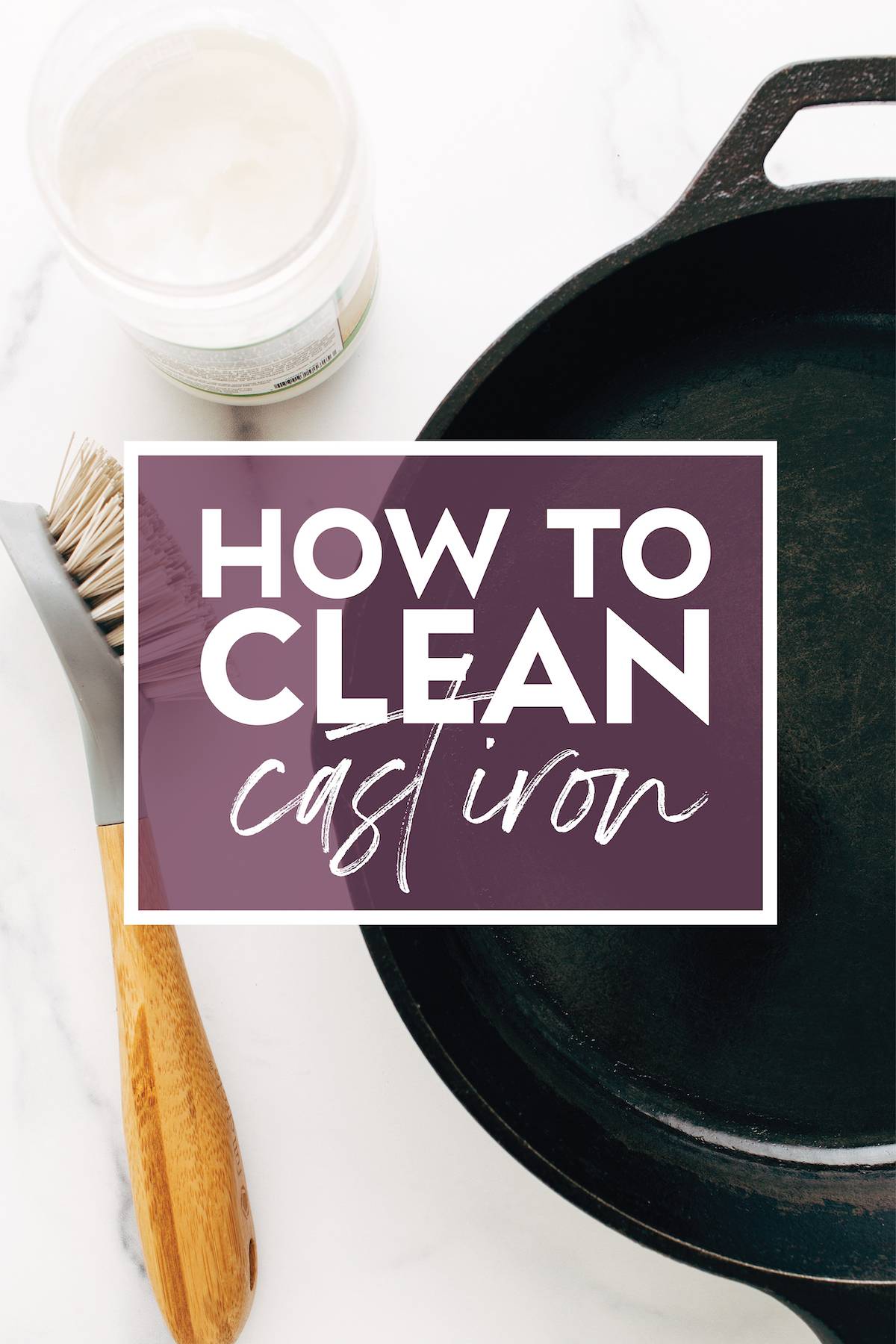
This post contains referral links for products we love. Pinch of Yum earns a small commission on these links at no cost to you, and the links will always be marked with an asterisk. We ♡ honesty!
Cast iron skillets are one of our absolute favorite pans to cook with when we’re in the kitchen. They’re affordable, they can be used for nearly any recipe, they’re kitchen powerhouses that last FOREVER, and you don’t have to worry about any weird chemicals getting into your food from using the pan (in fact, it can even ADD nutrients to your food!).
Whether you’ve just purchased a brand new cast iron pan or are looking to revive a family-favorite and well-loved skillet that’s been passed down to you, we’ve got you covered with our ultimate cleaning and care guide to clean a cast iron skillet!
In This Post: Everything You Need For Cleaning a Cast Iron Skillet
- Why Cast Iron?
- How to Clean and Care for Your Cast Iron Skillet
- How to Season Your Cast Iron Skillet
- Preventing Rust on Your Cast Iron Skillet
- Favorite Recipes That Use a Cast Iron Skillet
- Best Products for Cast Iron Skillets
Our Favorite Cast Iron Skillet (+ Tools!)



Why Cast Iron?
That’s fair – it’s a legitimate question! Especially in the age of easy, non-stick, non-toxic, beautiful Instagram-worthy cookware.
It might be old-school (like, maybe you literally got a cast iron skillet handed down from your grandmother?), but there’s a reason why it quite literally stands the test of time.
Here’s why we love our cast iron:
- Versatility: It can go from stovetop, to oven, to grill, to campfire, making it a real one-pot champion.
- Flavor: We call it “seasoning” for a reason! Over time, your cast iron will only become more and more delicious with every meal.
- Sear-ability: It’s good for a lot of things, but when you want a good sear on your thinly-sliced meat or sturdy veggies? This is your gal.
- Longevity: It’s the pan we’ve had the longest relationship with, and it’s never been too far gone in needing a little spiff-up.
How To Clean and Care For Your Cast Iron Skillet
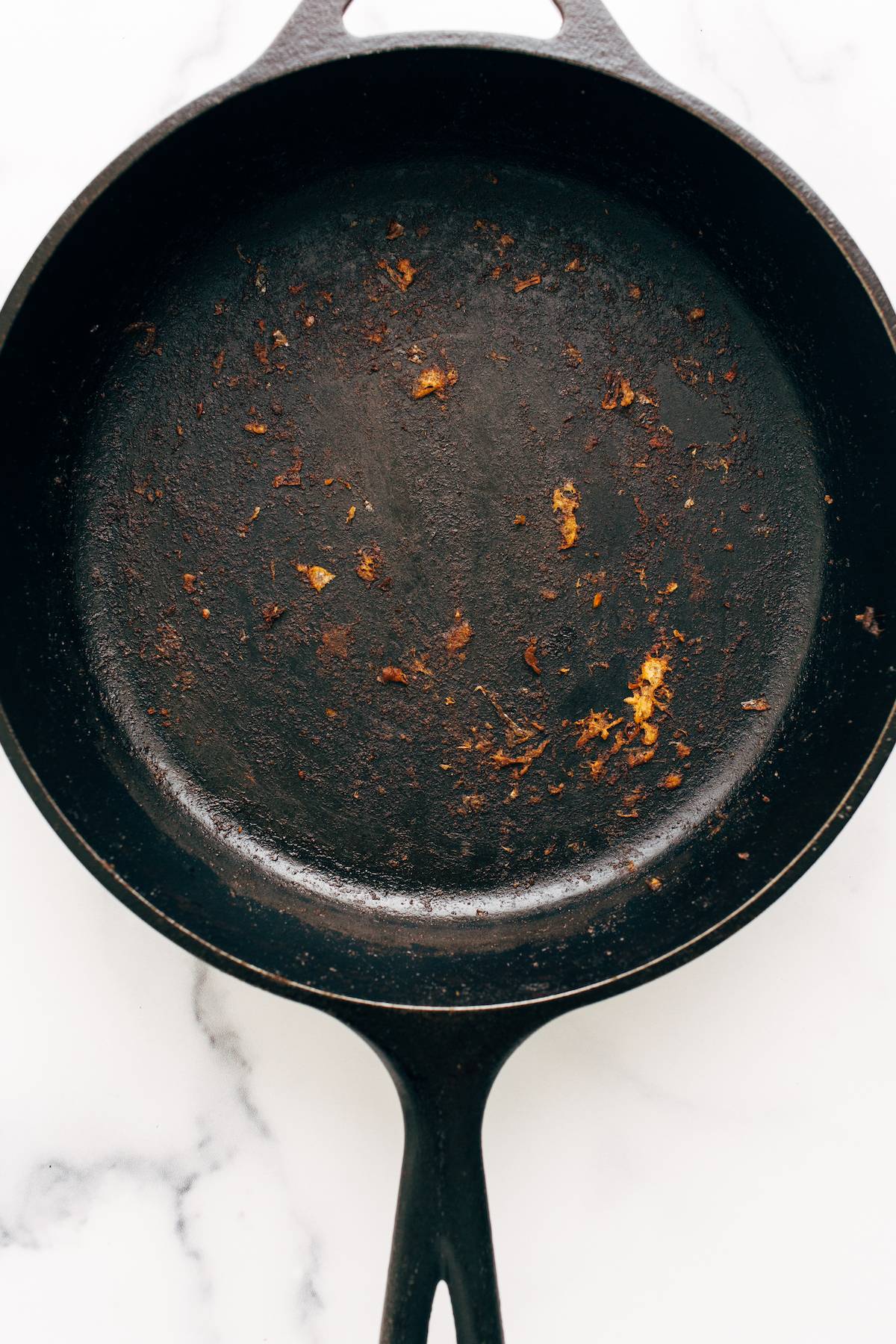
There always seem to be lots of dos and don’ts when it comes to caring for your cast iron pan. Here are some of the best practices for cleaning your cast iron skillet.
How To Clean a Cast Iron Pan After Cooking (Go-To, Everyday Method)
- Scrub gently in hot water with a Cast Iron Brush*.
- Dry the pan.
- Place the dry, empty pan over high heat for 3-5 minutes to further dry it out – this will help make it “thirsty” so it absorbs a fresh layer of oil.
- Add 1-2 teaspoons of canola oil or coconut oil to the pan. Rub the oil into the hot pan really well (and carefully) with a paper towel or soft cloth until the oil is absorbed.
- Remove from heat! You’re done.
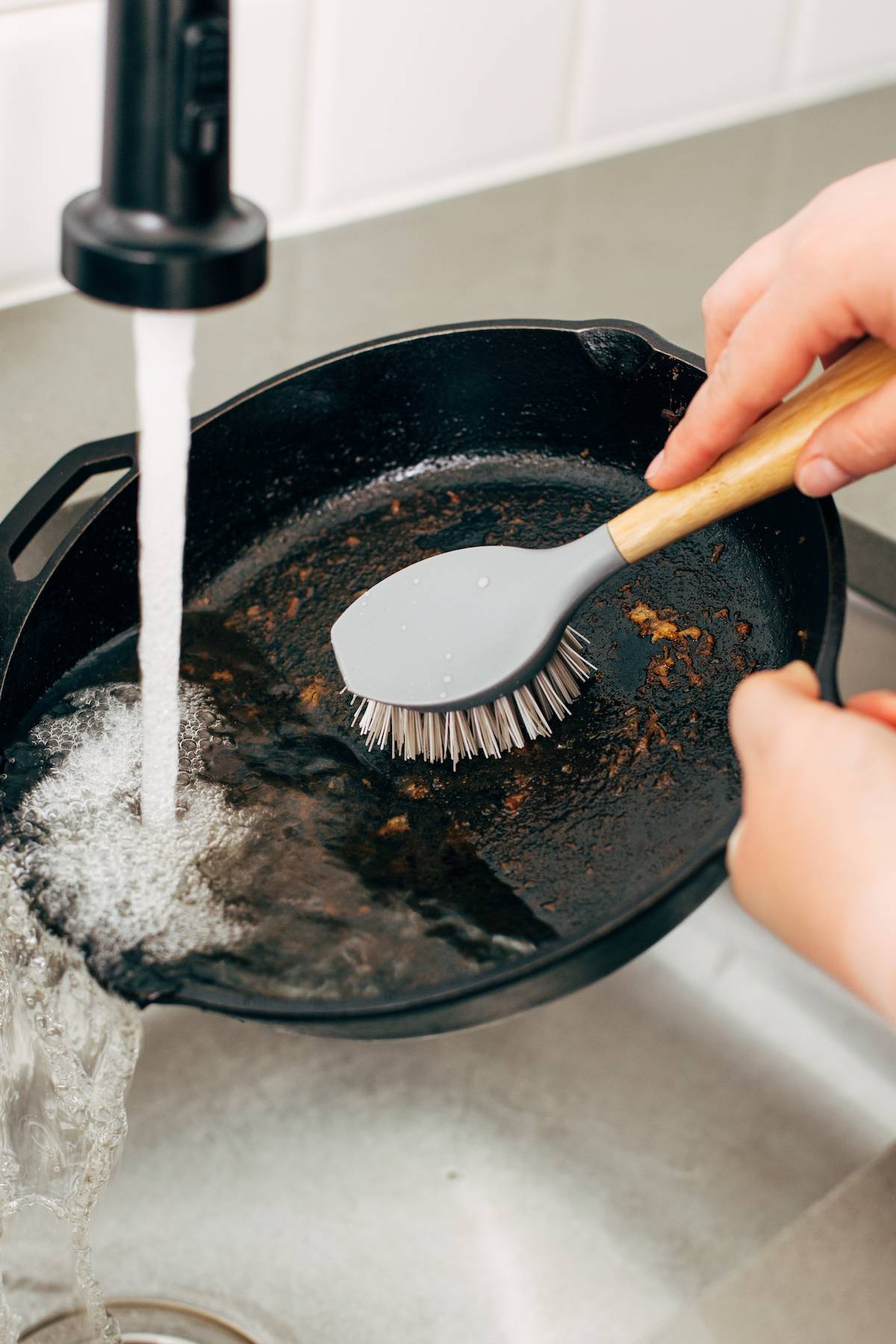
How To Clean A Cast Iron Pan with Crusty Food Stuck On
- Take a paper towel and wipe out as many big chunks of baked-on food as you can. You can also use a cast iron pan scraper or cast iron brush if you have bits of food that are really tough to get off. If you’re in a pinch and don’t have the scraper or brush, you could also use cut a potato in a half and work the baked-on food out of the pan with a little bit of baking soda.
- If needed, add 1+ cup of salt to the pan and scrub thoroughly to continue cleaning it.
- If needed, add water and bring back to a low simmer to loosen the bits of food.
How To Clean A Cast Iron Pan That is Very, Very Far Gone
- Working outdoors, place your cast iron skillet on an extra-large plastic bag or trash bag.
- Liberally spray oven cleaner over the entire skillet. Make sure to wear thick rubber gloves for this step to avoid hurting your skin from the cleaner.
- Seal up the skillet up in the plastic bag and leave the cleaner-soaked skillet outside or in the garage for 24 hours to let everything soak in.
- After 24 hours, scrub the skillet with steel wool and very, very hot soapy water. It’s best to wear rubber gloves for this step again. Rinse skillet and repeat this step.
- Make a vinegar/water solution by combining 2 cups of vinegar and 2 cups of water together. Pour this mixture into the skillet and let is sit for about 1 hour.
- Reseason your cast iron skillet following the instructions above.
Frequently Asked Questions About Caring For a Cast Iron Skillet
How often should you season your cast iron skillet?
Generally, we recommend seasoning your cast iron about once per month, but after every time you use it works as well if you find that it could use some seasoning.
What type of oil is best for seasoning a cast iron skillet?
Canola, vegetable, or coconut oil are best.
Can I use soap to clean my cast iron skillet?
Please don’t! Not using soap when cleaning is crucial to maintaining the delicious seasoning that comes with using a cast iron.
How To Season Your Cast Iron Skillet
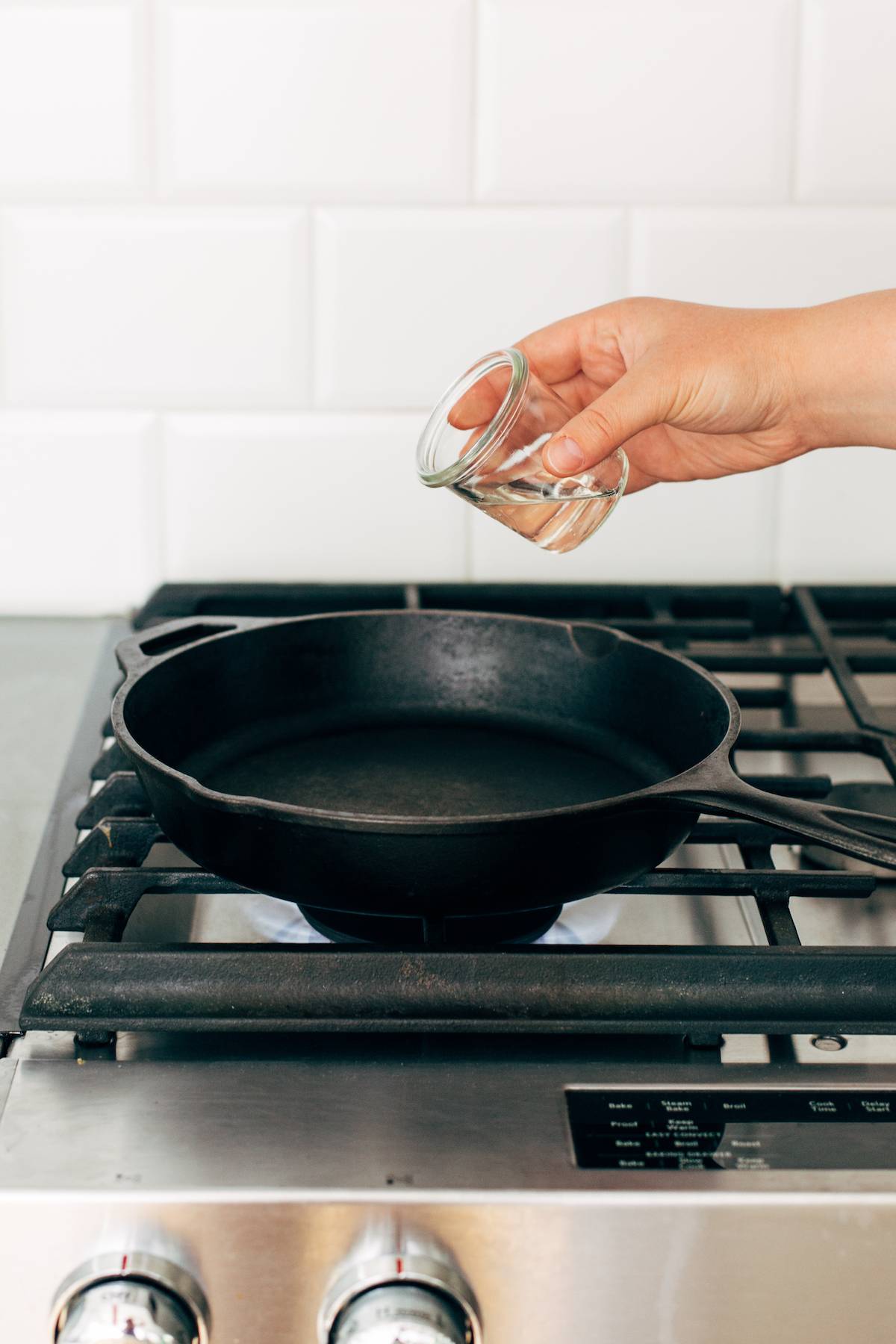
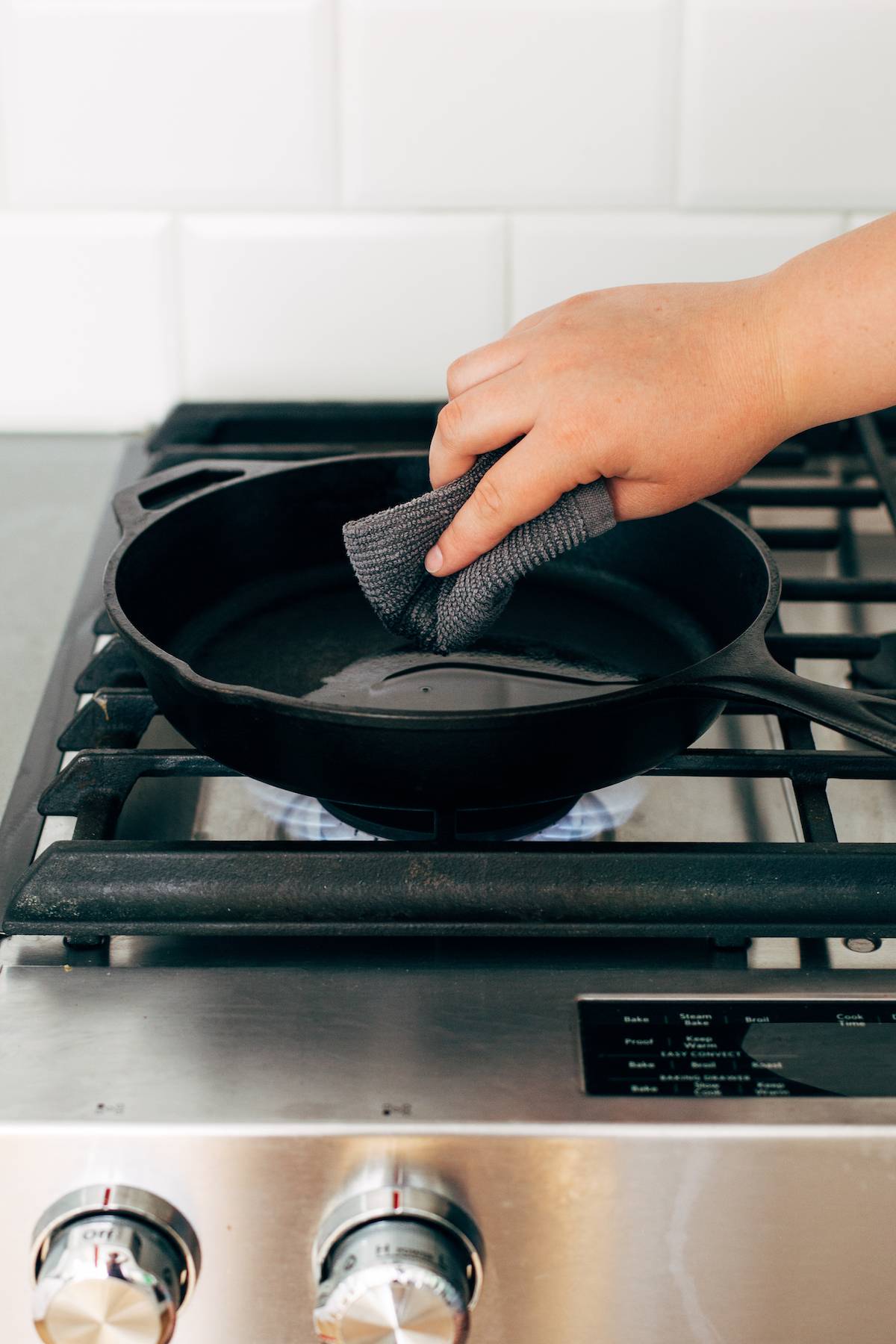
Seasoning Your Skillet
To do a thorough seasoning of your cast iron skillet, we suggest the following about 1x/month, depending on how often you use your pan.
- Ensure the pan is completely clean and dry.
- Season the pan by adding a 1/4 cup of canola oil or coconut oil to the entire pan.
- Put the skillet in the oven at 350 degrees for 1 hour upside down on a sheet pan to fully dry out.
A Note on Buying a Pre-Seasoned vs. Unseasoned Skillet
Both pre-seasoned and unseasoned skillets can be purchased when buying your pan. It should clearly list on the packaging what type you’re buying, but you’ll know a cast iron skillet is seasoned when it has a shiny coating on the pan. A pre-seasoned skillet is ready to use straight from the package. An unseasoned skillet should be seasoned before its first use.
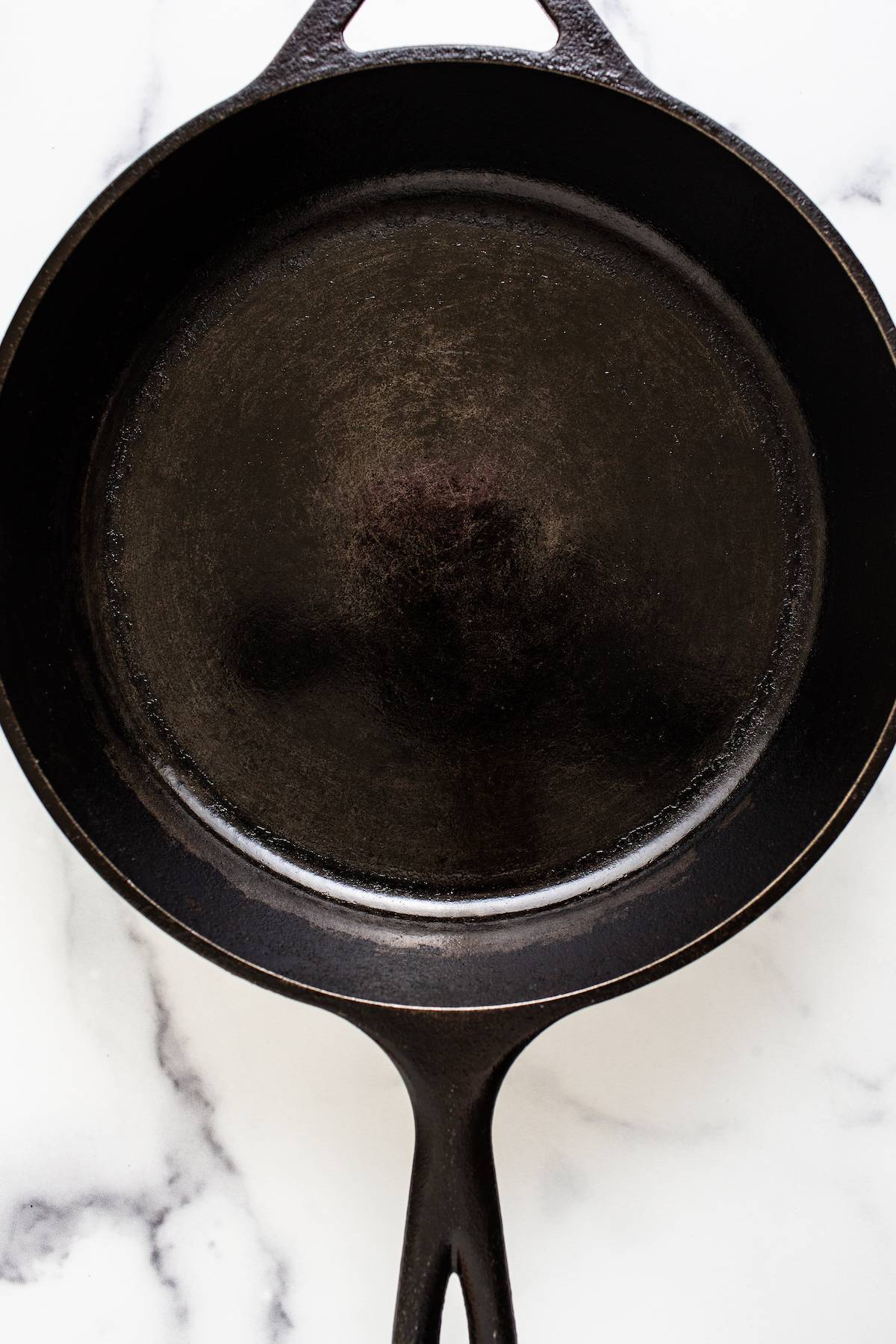
Preventing Rust On Your Cast Iron Skillet
Rust! *grimaces inside*. It can happen when you have a pan made from iron. Here are some tips to prevent that orangey foe from hanging out on your skillet.
- Put your cast iron pan away thoroughly dry. Any wetness can lead to rust.
- Avoid soaking your pan in water for long periods of time.
- Season your pan with oil after each use.
- Minimize cooking highly acidic foods in your pan, like tomatoes, lemon, or vinegar.
If you have rust on your pan you’re looking to do away with, go through a full skillet cleaning and deep seasoning. When cleaning your pan out with salt, it can help to use a cast iron chain scrubber* to remove really stubborn rust.
Products We Love When Using a Cast Iron Skillet
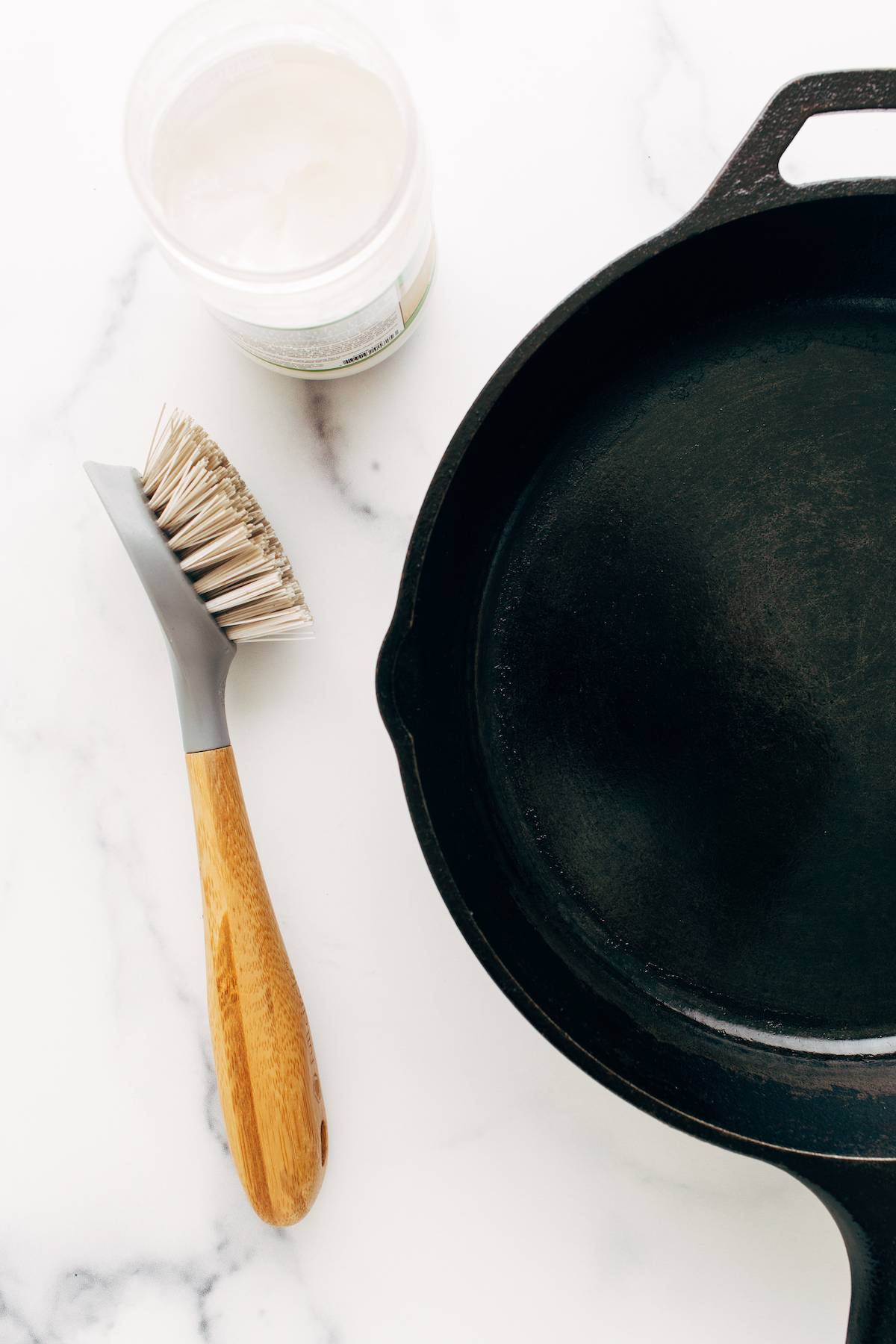
- Cast Iron Skillet* (the queen herself)
- Cast Iron Pan Scraper* (to help get those caked-on bits off your pan)
- Cast Iron Brush* (an alternative to the scraper above)
- Cast Iron Chain Scrubber* (helps remove stubborn rust and food)
- Coconut Oil* (to help season your pan)
